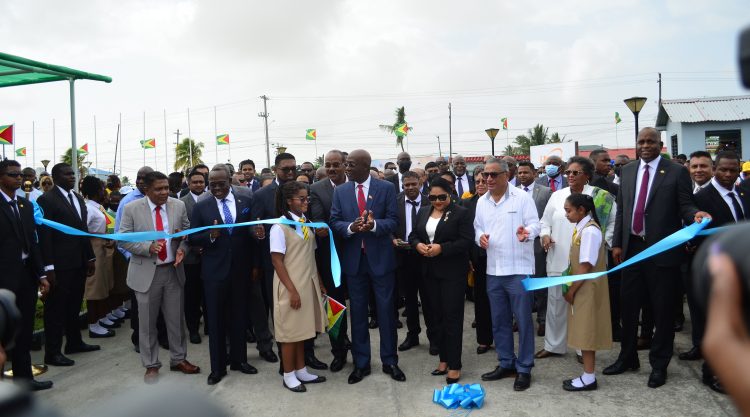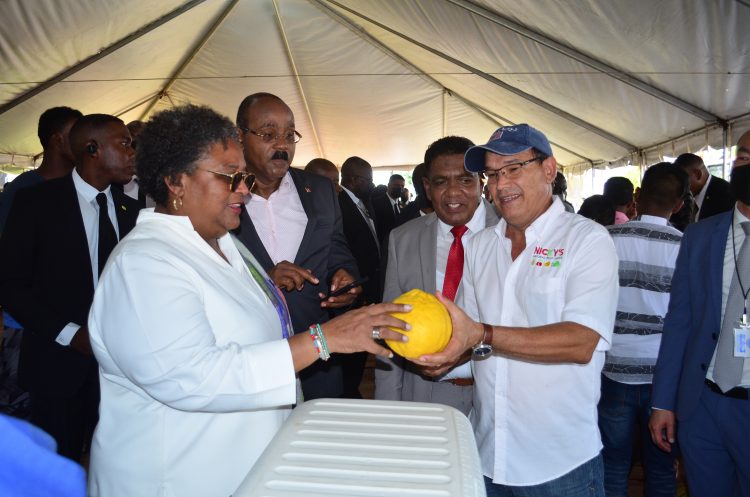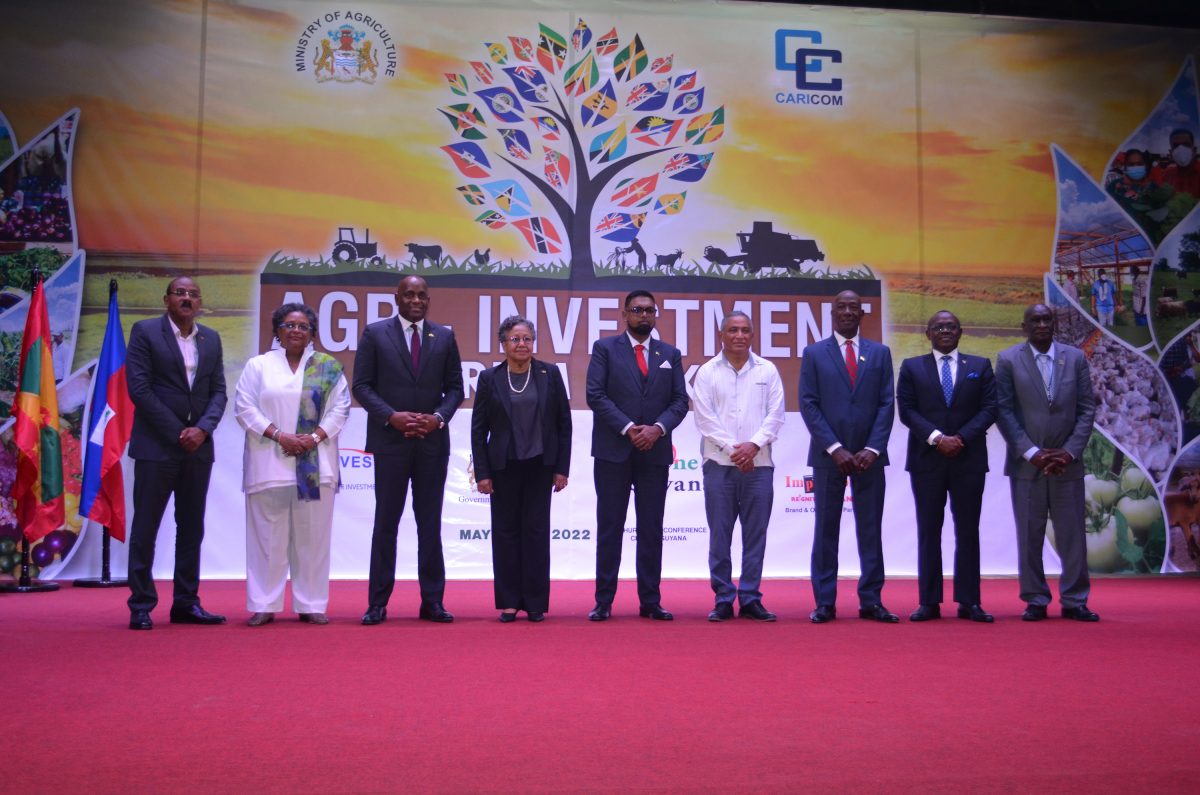Caribbean Community (CARICOM) leaders yesterday agreed that regional trade barriers must be removed and investments in shipping are required if they are going to achieve food security and the goals of 25 by 2025.
The calls for a review of trade policies and investments were made during the opening of the three day Agri-Investment Forum and Expo. It is the regional body’s goal to reduce the dependence on imported food items from outside of CARICOM by 25% by 2025.
The leaders in their addresses acknowledged that they must work together to ensure this vision becomes a reality and not another missed opportunity for the region as had occurred with the Jagdeo Initiative that was launched in 2007 to promote food security and regional trade.


Recognising the potential of the inter-regional food trade system, Antigua and Barbuda Prime Minister Gaston Brown said investments must be made in infrastructure to allow for easy shipment of produce.
He stated that as it is, it is easier to transport food from Miami, US, into the region as opposed to trading with a brother and sister nation.
“The regional approach is necessary to increase food production in all of our territories but it is insufficient to produce more food if we fail to transport and distribute it. Let us not fool ourselves if we do not have adequate transportation then all our efforts will be in vain,” Brown said as he highlighted the need for an affordable logistical approach.
He pointed out that the Caribbean food import bill stands at approximately US$6 billion and the dependence of nations for food supply at a time when there are global supply chain issues, indicates the timely need for regional initiatives.
To this end, the Prime Minister stressed that reliable air and river transportation is imperative and requires the contribution of all member states. Noting that some are not willing to pay for the transportation to move produce, he suggested that a model be developed and implemented in order for countries to access produce from the region. “…We have to implement a programme of shared benefit and shared burden to address this very issue immediately.”
Barbados Prime Minister Mia Mottley remarked that while the region waits to hear from the United Nations on the global efforts, it is imperative that leaders take the responsibility and make preemptive moves to protect their people from the crisis before them.
She posited that the mindsets and policies of nations must be modernised and pave the way for foods to circulate and exit a single economic space. She stated that countries need to implement modern sanitary and protective measures for food imports.
“We have a responsibility now to change mindsets and to change policies…because if we don’t make the steps now to remove the barriers, God knows how we can create the productive base that President (Irfaan) Ali has so masterfully drafted for us, in terms of the plans to expand productivity, and to expand production,” the Barbadian leader said.
Like Brown, she too suggested investments be made for the transportation of produce and make ports of entry priority areas for investment. She suggested that they look at bridging the gap through the resuscitation of Caribbean air transport via a regional cargo line and transportation of people.
“The goods must reach the consumers in a way that is safe and affordable and it is put to us working with farmers, distributors, retailers, transport providers to bring this puzzle together” she added.
Mottley noted that in the context of food security, leaders must not only look at their nation’s population but also the visiting population.
“[We have to look at] food security in the context of the entire Caribbean region not just population of CARICOM but with the visitors we receive on an annual basis. Thirty-two million people requires us to have to feed them…”
Noting that the countries have become dependent on produce from other parts of the world, where the tourism population resides, she contended that the region has failed to showcase what the Caribbean truly offers.
“We bring people here and want to feed them what they eat from where they come. Our responsibility is to give them a flavour that may entice them to return… “This is offensive to an independent CARICOM. Where is the fresh juice from Dominica, Guyana or St Vincent? Where? We need a change in mindset,” she asserted.
She also stated that in order to change the mindset of nations, they must work with importers, distributors and retailers on the type of product being on the market.
Moving forward, Mottley said countries must look at initiatives that will encourage and promote agricultural activities if CARICOM is going to become a power house and the bread basket of the Americas. She stated that policies must be changed to eliminate bottlenecks in the sector.
“We need clean planting material, we need affordable inputs, we need to resolve the water issues driven by the ground water crisis and the droughts as result of climate, we need to be able to ensure we have proper insurance for our farmers, we need to ensure we can update and put in place the technical support in the fields for our farmers, we need to build our research capabilities, we need to adopt the suitable technology for our young people to enhance productivity and competitiveness We need to have effective storage and agro processing… and we need to address the vexatious issue… Praedial larceny through technology and security,” she underscored.
Prime Minister of Trinidad and Tobago Dr Keith Rowley also spoke on the topic and said that countries must do whatever it takes for them to achieve the goal of being a regional food basket.
Like speakers before him he too pointed out that with more food production, there will be challenges if the necessary infrastructure to move produce is absent. He said it is vital that investments be made in vessels and port of entries.
“If you really want to help CARICOM, then help the team of governments to fund and have operating vessels of that nature to bring people together by seas. It has been done; it needs to be done. Goods and services by sea after by rail is cheapest,” he said as he made the plea for leaders.
The Trinidad and Tobago leader said that even as they consider removing trade barriers in the region they must also consider the spread of diseases and put systems in place to eliminate the chances of this happening via the shipment of fresh and raw produce.
Rowley told the gathering and his fellow CARICOM leaders that they must not sleep on the opportunity at hand and they must seize this opportunity to implement measures that will save their nations should there a food crisis.
“Nobody is going to come to do it for us. We have to do it ourselves. Nobody will give us food when food is in short supply. Nobody! If we don’t put it in place now, then who can be blamed? The next time it happens, we should be in a better position not a worse position. We are aware of what we need to do, just let’s do it…I have seen this before, heard it before and don’t want to hear it again. We know what to do, the question is are we prepared to do it?” the Trinbagonian leader challenged.
Moreover, he suggested that the community look at the possibilities of creating a company register to allow for the free movement of goods and supplies. Rowley stated that his country and Barbados are already in talks for such a move as they seek to foster better trade relations.
He noted that register is a simple straightforward way to encourage entrepreneurship under the law and remove impediments.
Dominican PM Roosevelt Skerrit in his brief address said it insane that with the trade barriers created by some countries, sister nations in the region are not permitted to trade. He noted that due to those barriers, countries are forced to look at markets outside of the region.
Pointing out that there is need to act now on eliminating the challenges in trade in the region, he called on his colleagues to itemize the actions need to be taken to free the movement of goods.
From his perspective, the Dominican leader said the elimination of trade barriers will not only contribute to profitability, but also the wellbeing and welfare of every Caribbean citizen.
He called for concessions to be granted to farmers as an incentive to scale up their production.
“We give concessions to hotels to import food but not to farmers. We have to remove those fractious conditions on trade and necessary actions must be taken… We need to work together allow ordinary folks true benefits of the integration, farmers, the fishers, this will help us dramatically,” Skerritt posited.
He used the opportunity to call on his colleagues to concretise their recommendations for the 25 by 2025 goals and work towards those goals.
In a passionate address Montserrat’s Premier Joseph Farrell challenged his fellow Caribbean leaders to make the vision of the forum a reality.
He said that for too long Caribbean leaders have been speaking of this initiative and it is yet to be realised. “Let us put our money where our mouth is and invest in shipping,” he challenged his fellow leaders.
“For over 25 years the region has been speaking to movement of food from one country to the other, and to this day we have not succeeded, so then we now need investment in shipping, so that we can move those products from Guyana in the South, to Jamaica in the north, from Dominica in the south to Montserrat and Antigua. This is what we need at this point in time,” he stated.
He pointed out that the challenge is not having access to food but having food available when it is needed the most is also of utmost importance.
“What if something happens and the region is not able to produce food? Our people will die, and that is why we must all rally around this vision, and put it into practice so that at least we begin to produce food for the nations of the region. It is absolutely critical that we do that,” he said.
Farrell however, suggested that as leaders they look at a model where every country develops and cultivates a selection of crop and specialises in that area. Moves like these he said will allow everyone to have an opportunity to accessing foods required.
“There is no need for all of us to produce everything. We must begin to specialise. If Belize is producing oranges, I don’t need to produce oranges, we need to specialise and seriously produce and get those produce out of our countries and to the countries who need them most,” he added.






